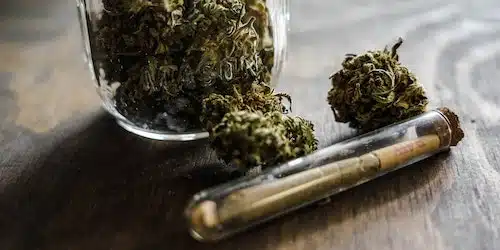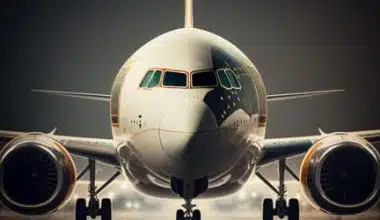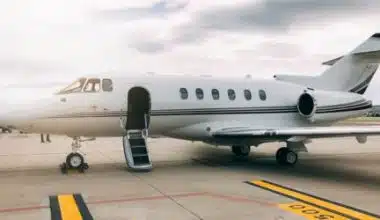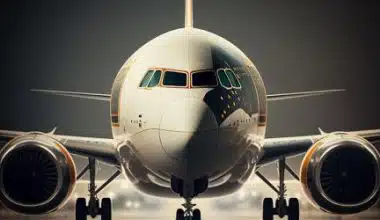Can you bring weed on a plane? It’s a question that many people ask, especially now that more and more states are legalizing marijuana. Unfortunately, the answer is not simple.
Marijuana is still illegal under federal law in the United States, and this includes bringing it on a plane. The Transportation Security Administration (TSA) does not search for marijuana specifically, but if they find it, they are required to report it to the local law enforcement.
The consequences of being caught with marijuana on a plane can vary depending on the state in which you are caught and the amount of marijuana you have. In some states, you may be given a warning or a citation, while in other states, you could be arrested and charged with a crime.
There are a few exceptions to the rule against bringing marijuana on a plane. For example, medical marijuana is allowed on planes if you have a valid prescription from a doctor in a state where medical marijuana is legal. However, it is important to note that you must check with the airline in advance to make sure that they allow medical marijuana on their flights.
Can You Bring Weed On A Plane?
The federal government still criminalizes marijuana, even though it is legal for recreational use in several states. According to the Transportation Security Administration (TSA), CBD oil and other products containing cannabis are still unlawful under federal law. FDA-approved products or those with a THC content of less than 0.3 percent on a dry weight basis are the exceptions and can be brought on board in both carry-on and checked luggage. Nonetheless, these rules apply regardless of where you are flying from or to.
Reasons Why You Can’t Bring Weed On A Plane
You cannot bring weed on a plane for several reasons, including:
#1. Legal Restrictions
Cannabis, including weed, is illegal in many countries and jurisdictions. Cannabis is a controlled substance, making its possession, sale, or transportation illegal.
#2. Airport Security
Transportation Security Administration (TSA) officers do not search for marijuana or other illegal drugs. However, if they come across it during the security screening process, they are required to report it to law enforcement authorities.
#3. Federal Laws
Cannabis is still illegal under federal law in many countries, including the United States. This means that even if you are traveling between states or countries where cannabis is legal, it is still illegal to transport it across state or national borders.
#4. International Travel
When traveling internationally, you must comply with the laws and regulations of both your departure and destination countries. Many countries have strict drug laws, and attempting to bring weed across international borders can result in severe legal consequences, including arrest and imprisonment.
#5. Airport Policies
Airports have their own policies regarding prohibited items, and cannabis is typically included on the list of prohibited items. This means that even if you are traveling within a country where cannabis is legal, you are not allowed to bring it onto the plane.
#6. Safety Concerns
The use of cannabis can impair judgment, coordination, and reaction time. Bringing weed on a plane could pose a safety risk to yourself, other passengers, and the flight crew. Air travel requires alertness and attentiveness, and any substance that can impair these abilities is prohibited.
#7. Federal Aviation Administration (FAA) Regulations
The FAA prohibits the possession, use, and transportation of marijuana on aircraft. This applies to both medical and recreational marijuana, regardless of whether it is legal in the departure or destination locations.
#8. Conflicting State and Federal Laws
While some states or countries have legalized cannabis for medical or recreational use, it remains illegal at the federal level. Airports and airlines must adhere to federal laws and regulations, which consider cannabis a controlled substance. This creates a conflict between state and federal laws, making it illegal to transport cannabis across state lines or through federal airspace.
#9. Airport Dogs and Detection Technology
Airports often use trained dogs and advanced detection technology to identify illegal substances. These measures can detect the presence of marijuana, even in small amounts. If you are caught with weed, you may face legal consequences.
#10. Air Quality and Smoke Detection
Smoking or vaping cannabis on a plane is strictly prohibited due to the risk it poses to air quality and the potential for smoke detection systems to be triggered. Smoke detectors on planes are designed to detect fires, and any smoke produced by smoking or vaping cannabis could lead to unnecessary alarm, diverting the plane and causing disruptions.
Consequences Of Bringing Weed On A Plane
Bringing weed on a plane can have various consequences. They are
#1. Confiscation by TSA
If the Transportation Security Administration (TSA) discovers marijuana during the screening process, they will likely confiscate it. The TSA’s primary focus is on security threats, so they may not actively search for marijuana, but if it is found, they may take action.
#2. Legal Penalties
The consequences of attempting to bring weed on a plane can vary depending on the jurisdiction. While marijuana may be legal in certain states, it is still illegal under federal law. If caught with illegal amounts of weed, you may face penalties according to the relevant state’s laws.
#3. International Travel Complications
Bringing weed on a plane while traveling internationally can be even more complex. Marijuana is still banned outright in many countries, and even smaller amounts could lead to hefty fines or more severe punishments.
#4. Risk of Being Denied Boarding
Airlines have the right to refuse boarding to passengers who appear to be under the influence of drugs or whose conduct is disorderly, abusive, or violent.
#5. Federal Charges
Because marijuana is still illegal under federal law, attempting to bring it on an aircraft could result in federal penalties. State laws for marijuana-related offenses may not be as harsh as federal laws, which may involve lengthy prison terms and higher fines.
#6 Travel Restrictions
Bringing weed on a plane can result in travel restrictions, including being banned from certain airlines or airports. It could also impact your ability to obtain visas or travel internationally in the future.
#7. Damage to Reputation
Being caught with marijuana at an airport can damage your reputation, especially if the incident becomes public knowledge. This can have consequences in various aspects of your personal and professional lives.
#8. Loss of TSA PreCheck or Global Entry
If you are enrolled in TSA PreCheck or Global Entry, attempting to bring marijuana on a plane can lead to the revocation of these privileges. These programs expedite security screening, but they require participants to adhere to certain rules and regulations.
#9. Increased Scrutiny
If you are suspected of attempting to bring marijuana on a plane, you may be subjected to additional security checks, including searches of your personal belongings, body scans, or questioning by airport security or law enforcement.
#10. Loss of Employment or Professional Opportunities
Being caught with marijuana at an airport could have negative consequences for your employment or professional opportunities. Some employers have strict drug policies, and a drug-related offense could result in termination, suspension, or difficulty finding future employment.
Other Cannabis Products That You Cannot Bring on a Plane
When it comes to bringing cannabis products on a plane, it’s important to note that regulations and laws vary depending on the jurisdiction. However, as a general rule, it is not permissible to bring cannabis or cannabis products on a plane, especially if they contain THC, the psychoactive compound found in cannabis.
Here are some types of cannabis products that are not allowed to be brought on a plane
#1. Flower/Buds
The dried flowers or buds of the cannabis plant, which are commonly smoked or vaporized, are generally prohibited from being brought on a plane.
#2. Edibles
Cannabis-infused food products, such as brownies, gummies, or chocolates, are also typically not allowed on a plane. These products can be easily mistaken for regular food items and may violate regulations regarding the transportation of controlled substances.
#3. Concentrates
Cannabis concentrates, including oils, waxes, shatter, or hash, are highly potent forms of cannabis. These products are generally not permitted on a plane due to their high THC content and the potential for misuse or accidental ingestion.
#4. Vapes and Cartridges
Vaporizers and vape cartridges containing cannabis oil or liquid cannabis are typically not allowed on a plane. These products may violate regulations regarding the transportation of controlled substances and can be mistaken for nicotine-based vaping devices.
#5. Topicals
Cannabis-infused creams, lotions, or balms that are applied to the skin for localized relief are generally not allowed on a plane. These products may contain THC and can be considered as cannabis derivatives.
#6. Tinctures and Oils
Cannabis tinctures and oils, which are concentrated liquid forms of cannabis, are generally not permitted on a plane. These products often contain THC and can be considered as cannabis derivatives.
#7. Patches
Transdermal patches infused with cannabis, which are designed to deliver cannabinoids through the skin, are not allowed on a plane. These patches may contain THC and can be considered cannabis products.
#8. Suppositories
Cannabis suppositories, which are inserted rectally or vaginally for localized effects, are generally not permitted on a plane. These products can contain THC and are considered cannabis derivatives.
#9. Beverages
Cannabis-infused beverages, such as cannabis-infused sodas, teas, or coffees, are typically not allowed on a plane. These products may contain THC and can be considered as cannabis derivatives.
#10. Seeds
Cannabis seeds, which are used for cultivation purposes, are generally not permitted on a plane. These seeds can be considered cannabis products and may violate regulations regarding the transportation of controlled substances.
Expectation to Bring Weed on a Plane
Weed possession is generally prohibited on planes, but exceptions or specific regulations may apply in certain situations, such as when certain circumstances allow it.
#1. Medical Marijuana
In some jurisdictions where medical marijuana is legal, individuals with a valid medical prescription or card may be allowed to travel with their medication. However, it’s crucial to research and comply with the specific regulations and requirements of both the departure and destination locations. It’s advisable to carry proper documentation and notify the airline in advance.
#2. Legalization in Specific Locations
People may be permitted to possess and travel small amounts of marijuana inside the borders of certain jurisdictions where it is legal to use marijuana recreationally, such as Canada or a few states in the United States. It’s crucial to remember that it is still illegal to move marijuana across international borders or on airplanes that go across state or national boundaries.
#3. Local Exemptions or Decriminalization
Some regions or cities may have local exemptions or decriminalization measures in place that allow for the possession or use of small amounts of marijuana. However, these exemptions are limited to the local jurisdiction and may not apply to air travel or crossing borders.
Can Airport Security Detect Weed?
Airport security scanners are designed to detect various materials, including organic and inorganic substances and they may be able to detect cannabis as an organic material. Although TSA officers are primarily focused on security threats rather than searching for drugs, they are not specifically programmed to detect marijuana or other illegal drugs. However, if an illegal substance is discovered during security screening, Transportation Security Administration (TSA) officers are required to report it to law enforcement authorities.
Can Airport Dogs Smell Weed?
Airport dogs, specifically trained to detect various substances, including drugs, can indeed detect the scent of marijuana. However, the main focus of these dogs is on detecting explosives and other security threats rather than searching specifically for drugs. While some dogs may be trained to detect multiple drugs, recent state court rulings on marijuana have resulted in some dogs no longer being trained to specifically sniff out cannabis.
Can Airport Scanners Detect Tobacco Vs Weed?
Airport scanners are primarily designed to detect security threats such as explosives and weapons, rather than distinguishing between tobacco and weed. The density of leafy substances like marijuana is not significant enough to be noticeable compared to the materials used in luggage. Therefore, airport scanners are unlikely to specifically detect tobacco or weed. However, if any illegal substance is discovered during security screening, TSA may refer the matter to law enforcement authorities.
Do Checked Bags Get Searched For Drugs?
Checked bags are not routinely searched for drugs but there are measures in place to identify suspicious or prohibited items. The primary focus of airport security, including the Transportation Security Administration (TSA), is on security threats rather than specifically searching for drugs.
How Far Can Weed Smell Travel?
The scent of weed can travel further than you might expect. According to anecdotal evidence and personal experiences, the smell of weed can be detected from varying distances. Some individuals claim to have detected the smell of weed from as far as several meters away, while others mention smelling it even further, depending on factors such as wind conditions and the potency of the smell.
Can Drug Dogs Smell Weed in a Bag?
Drug dogs, also known as sniffer dogs, are trained to detect the scent of various substances, including marijuana. These dogs have a highly sensitive sense of smell, and they are trained to detect specific odors like weed.
Does Walking Get Rid Of The Weed Smell?
Walking alone may not eliminate the smell of weed from your person, but it can help to disperse the odor. When you walk, the movement of air and increased ventilation can help reduce the lingering smell of weed on your clothes or body. Additionally, being outdoors can help to minimize the concentration of the smell.
Conclusion
Bringing weed on a plane is a complex issue due to conflicting state and federal laws. While some states have legalized marijuana, it is still illegal under federal law. The TSA’s primary focus is on security threats, but if they come across marijuana during screening, they may take appropriate action. Cannabis is illegal on planes due to legal restrictions, airport security, federal laws, and international travel regulations.
FDA-approved cannabis products and those with less than 0.3% THC are exceptions. Bringing marijuana on a plane can result in various consequences. The TSA’s primary focus is on security threats, and attempting to bring weed on a plane can lead to severe consequences. These products can be mistaken for regular food items and may violate regulations on controlled substance transportation. Additionally, vape cartridges containing cannabis oil or liquid are not allowed.
- HOW TO TRAVEL WITH A DOG: Detailed Guide
- FIRST-TIME FLYING TIPS: 15 Best Tips(Opens in a new browser tab)
- WHAT IS THE KNOWN TRAVELER NUMBER KTN? All You Need To Know
- THE ULTIMATE TRAVEL ESSENTIALS LIST (With Travel Packing Tips)
- IS SUPPORT PETS LEGIT? 2023 REVIEWS






